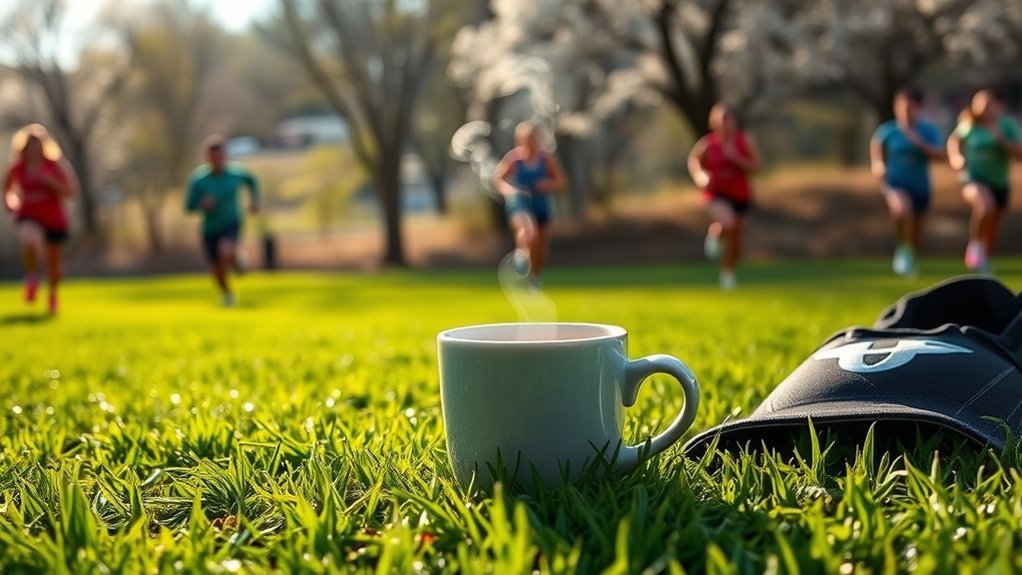The Benefits of Coffee for Spring Sports
Coffee offers numerous benefits for spring sports athletes. It boosts endurance by increasing adrenaline levels, helping you push through longer, tougher sessions. You’ll find improved focus and quicker reaction times, which can give you an edge during competitions. Plus, coffee aids recovery by reducing muscle soreness and promoting glycogen replenishment. Timing your intake can maximize these advantages, while customizing your coffee experience can elevate your enjoyment. Keep exploring to discover how coffee can enhance your athletic performance even further!
Enhanced Endurance for Long Practices

When you’re pushing through a long practice, coffee can be your secret weapon for enhanced endurance. Studies show that caffeine, in the right dosage, can considerably improve your performance in endurance training. Just a moderate intake of about 3-6 mg per kilogram of body weight is often enough to boost your stamina. Caffeine works by increasing adrenaline levels, which helps release fatty acids from fat tissues, providing your body with more fuel during extended activities. This means you can train harder and longer without hitting that dreaded wall. So, if you’re looking to break through your limits and enjoy the freedom of longer practices, consider reaching for that cup of coffee before you lace up your shoes.
Boosting Focus and Concentration
After boosting your endurance with a caffeine kick, you might find that coffee also sharpens your focus and concentration during training. Studies show that caffeine enhances cognitive performance, helping you stay alert and engaged. By incorporating focus techniques, like setting specific goals for each practice, you can maximize the benefits of coffee. Additionally, concentration exercises, such as mindfulness or visualization, can further enhance your mental clarity. Imagine executing plays with precision while feeling mentally sharp—this is the power of coffee combined with intentional training. Embracing these strategies allows you to tap into your full potential, making every practice count. So, grab that cup of coffee and get ready to elevate your game, both physically and mentally!
Improved Reaction Times

When you sip on coffee, you’re not just enjoying a tasty beverage; you’re also boosting your reaction times. Research shows that caffeine enhances neuromuscular coordination and increases mental alertness, allowing for quicker decision-making during intense sports activities. With improved reaction times, you can stay one step ahead of your competition, making each moment on the field or court count.
Enhanced Neuromuscular Coordination
Although many factors contribute to athletic performance, enhanced neuromuscular coordination is vital for achieving ideal reaction times during competition. When you engage in neuromuscular training, you’re not just building strength; you’re refining the mind-body connection that enables quicker, more accurate responses. This is especially important in sports where split-second decisions can determine the outcome. Incorporating coordination exercises like agility drills and balance training can considerably improve your reaction times, allowing you to respond faster to opponents or changing conditions. Coffee can further enhance these benefits by increasing adrenaline levels, giving you that extra edge. So, consider integrating both coffee and targeted training into your routine to elevate your performance this spring. Your body and mind will thank you!
Increased Mental Alertness
While you might already know that coffee can perk you up, its role in increasing mental alertness—particularly for improving reaction times—deserves special attention. Research shows that caffeine enhances cognitive performance, sharpening your focus and boosting your mental stamina during those essential moments in spring sports. When you’re alert, your brain processes information faster, allowing for quicker reactions to dynamic situations, like dodging opponents or making split-second decisions. This heightened state of awareness can be the difference between winning and losing. By incorporating coffee into your pre-game routine, you’re not just fueling your body; you’re also priming your mind. So, grab that cup and get ready to excel—your alertness is your ally on the field!
Faster Decision-Making Skills
As you step onto the field, the ability to make quick decisions can set you apart from your competitors. Coffee’s caffeine boosts cognitive agility, enhancing your brain’s processing speed. Research shows that caffeine can improve reaction times, giving you the edge when split-second decisions matter. This heightened alertness allows for better strategic thinking, enabling you to assess plays and make choices more effectively. Whether you’re a soccer player dodging defenders or a basketball player maneuvering fast breaks, that extra mental clarity can be a game-changer. So, before practice or a match, consider that cup of coffee. It’s not just a pick-me-up; it’s a tool for sharpening your skills and releasing your full potential on the field.
Reducing Perceived Effort

When you sip on coffee before a workout, you might find that the effort feels less intimidating. This isn’t just in your head; research shows that caffeine can lower perceived exertion during exercise. It helps you push through tough workouts by enhancing your focus and motivation. If you’ve built a solid caffeine tolerance, you may experience even greater benefits, as your body adapts to the stimulating effects. This adaptation can lead to improved endurance and performance, making those longer runs or intense training sessions feel more manageable. So, whether you’re gearing up for a game or hitting the gym, a cup of coffee could be your secret weapon to tackle those challenges with ease. Enjoy that freedom to perform!
Accelerating Recovery Post-Workout
After an intense workout, you may find yourself looking for ways to speed up recovery, and coffee might be more helpful than you think. Research suggests that caffeine can enhance muscle glycogen resynthesis, which is vital for replenishing your energy stores post-exercise. By promoting glycogen recovery, coffee helps your muscles bounce back faster, allowing you to feel more energized for your next session. Additionally, coffee can stimulate insulin sensitivity, further aiding glycogen uptake. Just remember, while coffee can provide these benefits, it’s important to maintain your hydration levels. Balancing your coffee intake with adequate water will guarantee your body recovers efficiently, keeping you ready for your spring sports adventures!
Hydration Considerations

While coffee can aid in recovery, it’s essential to keep an eye on your hydration levels. Caffeine does have diuretic effects, which can lead to increased urination and potential dehydration. To counter this, consider hydration strategies that incorporate water and electrolyte-rich drinks alongside your coffee. Aim to drink water before, during, and after your workouts to maintain peak hydration. Research shows that staying hydrated can enhance your performance, allowing you to enjoy the freedom of movement during sports. If you enjoy coffee pre-workout, balance it with extra fluids to mitigate caffeine’s effects. By being mindful of your hydration, you’ll guarantee that coffee serves as a beneficial tool rather than a drawback in your spring sports routine.
Antioxidant Benefits for Athletes
When you consume coffee, you’re not just getting a caffeine boost; you’re also tapping into its powerful antioxidants. These compounds can help neutralize free radicals, enhance your recovery process, and reduce muscle inflammation after intense workouts. Understanding these benefits can be a game-changer for your athletic performance and overall health.
Free Radical Neutralization
As you push your limits in sports, the oxidative stress your body endures can lead to the production of free radicals, which may impede performance and recovery. Luckily, coffee antioxidants can help neutralize these harmful compounds. Studies show that the antioxidants found in coffee, like chlorogenic acid, combat oxidative damage, enhancing your overall resilience. By incorporating coffee into your routine, you’re not just enjoying a delicious beverage; you’re also giving your body a fighting chance against the negative effects of free radicals. This means better endurance, improved focus, and a more efficient recovery process. So, sip on that cup of coffee before your next practice or game, and embrace the powerful benefits it can offer your athletic journey.
Enhanced Recovery Process
Incorporating coffee into your post-workout routine can considerably enhance your recovery process, thanks to its rich antioxidant profile. These antioxidants help neutralize harmful free radicals generated during intense exercise, supporting your body’s natural repair mechanisms. If you’re seeking effective recovery strategies, consider a moderate caffeine dosage—about 3-6 mg per kilogram of body weight—post-exercise. Research shows that this can maximize glycogen replenishment and reduce muscle soreness, allowing you to bounce back faster. Not only does coffee offer hydration benefits, but it also increases your alertness, helping you stay focused on your next training session. By making coffee a staple in your recovery plan, you’re setting yourself up for improved performance and a more enjoyable spring sports season.
Reduced Muscle Inflammation
The antioxidant properties of coffee extend beyond recovery; they also play a significant role in reducing muscle inflammation. For athletes like you, this means faster muscle recovery after intense workouts. Studies show that compounds in coffee, such as chlorogenic acid, help combat oxidative stress and inflammation, promoting a quicker return to peak performance. By incorporating coffee into your routine, you harness these benefits, allowing your muscles to repair effectively while minimizing soreness. This inflammation reduction not only enhances your training capacity but also keeps you feeling more energetic and ready to tackle your next challenge. So, enjoy that cup of coffee—it’s not just a boost; it’s a smart choice for your athletic journey!
Customizing Your Coffee for Performance
While many athletes enjoy coffee for its energy-boosting properties, customizing your brew can enhance performance even further. By experimenting with various coffee blends, you can discover the perfect combination that fuels your workout. For instance, try a dark roast for a stronger caffeine kick or a lighter roast for a smoother, milder flavor. Flavor enhancements like cinnamon or vanilla can not only make your coffee more enjoyable but also provide additional health benefits, like improved metabolism. Adding a dash of salt can help balance bitterness and enhance your overall experience. Remember, tailoring your coffee to your taste and performance needs isn’t just about enjoyment; it’s about maximizing your potential on the field or court.
Timing Your Coffee Intake

When it comes to maximizing your coffee benefits, timing is key. Consuming it about 30 to 60 minutes before your game can enhance your performance, while a cup post-workout can aid in recovery. Understanding these timing strategies can help you harness coffee’s full potential for your athletic endeavors.
Optimal Pre-Game Timing
To maximize the benefits of coffee on your performance, timing your intake is essential. For pre-game coffee to enhance your game, consider the following ideal timing tips:
- 1 hour before: This allows caffeine to peak in your bloodstream, giving you that much-needed energy boost.
- Avoid late consumption: Drinking coffee too close to game time might lead to jitters or an upset stomach, which can hinder your performance.
- Hydration matters: Pair your coffee with water to prevent dehydration, ensuring you’re fully prepared for your sport.
Post-Workout Recovery Boost
As you finish your workout, sipping on coffee can greatly enhance your recovery process. Research shows that coffee benefits post-exercise muscle recovery by reducing soreness and speeding up glycogen replenishment. Timing your intake is essential; consuming coffee within 30 minutes after your workout can optimize these recovery strategies.
| Timing | Coffee Benefits |
|---|---|
| Immediately Post-Workout | Reduces muscle soreness |
| 30 Minutes Later | Enhances glycogen replenishment |
| 1 Hour Later | Improves overall recovery |
| 2 Hours Later | Sustains energy levels |
Personalizing Your Coffee Experience
While many athletes rely on coffee for its performance-enhancing benefits, personalizing your coffee experience can elevate its impact even further. By exploring various coffee types, flavor profiles, brewing methods, and serving temperatures, you can find the perfect brew that suits your needs.
- Coffee Types: Experiment with different beans, like arabica for a smoother taste or robusta for a bolder kick.
- Flavor Profiles: Add spices or flavored syrups to create a drink that not only fuels you but also excites your palate.
- Brewing Methods: Try a French press for richness or cold brew for a smoother, less acidic option.
Tailoring your coffee experience can enhance your focus, energy, and overall enjoyment, making each sip a part of your athletic journey.
Frequently Asked Questions
Can Coffee Improve My Performance in Team Sports?
Imagine you’re a race car, and caffeine’s the turbo boost that kicks in just when you need it. Research shows that caffeine can enhance your performance in team sports by improving focus and endurance. Timing’s essential, so consuming it about 30-60 minutes before your game can maximize its effects. Just remember, balancing hydration is key; coffee’s diuretic properties can dehydrate you, so drink water too. With this balance, you’ll rev up your game effortlessly!
Is There a Risk of Caffeine Dependence for Athletes?
Yes, there’s a risk of caffeine dependence for athletes. As you consume caffeine regularly, your body can develop a caffeine tolerance, meaning you might need more to achieve the same effects. If you suddenly cut back, you could experience withdrawal symptoms like headaches, fatigue, or irritability. It’s essential to monitor your intake and consider cycling your caffeine use to enjoy its benefits without becoming reliant on it for performance.
How Much Coffee Is Safe Before a Game?
When considering how much coffee’s safe before a game, it’s essential to look at coffee consumption and caffeine timing. Most studies suggest that 3-6 mg of caffeine per kilogram of body weight can boost performance without adverse effects. For most, this translates to about 1-2 cups of coffee. However, timing matters; consuming it about 30-60 minutes before the game can optimize your energy levels. Just remember to listen to your body and adjust accordingly!
Are There Any Negative Side Effects of Coffee for Athletes?
Yes, there can be negative effects of coffee for athletes. If you’re sensitive to caffeine, you might experience jitters, increased heart rate, or anxiety, which can hinder performance. Additionally, excessive coffee consumption can lead to dehydration, as caffeine is a diuretic. It’s important to find a balance that works for you, considering your own body’s response. Pay attention to how you feel, and always listen to what your body’s telling you.
Can Decaf Coffee Provide Benefits for Sports Performance?
Did you know that around 30% of coffee drinkers opt for decaf? While it might seem less potent, decaf can still offer performance enhancement for athletes. Research suggests decaf benefits like improved hydration and reduced anxiety, which can positively impact your focus and endurance. So, if you’re sensitive to caffeine but still want that boost, sipping decaf before your workout could be a smart choice for maintaining your edge during sports activities.






